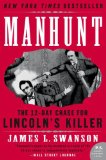Summary | Excerpt | Reading Guide | Reviews | Beyond the Book | Readalikes | Genres & Themes | Author Bio

The 12-Day Chase for Lincoln's Killer
by James L. SwansonChapter Two: "I Have Done It"
Legend has it that John Wilkes Booth was hiding outside in the
shadows near the front door of Ford's as the presidential carriage rocked down
the uneven dirt street and slowed to a stop, but no one really knows where he
was at that precise moment. On April 29, 1865, Clara Harris wrote in a letter,
"They say we were watched by the assassins; ay, as we alighted from the carriage
. . . and when I think of that fiend barring himself in with us, my blood runs
cold." Wherever Booth was it is almost certain that somehow he verified with his
own eyes that the Lincolns were actually inside the theatre. And he probably
wondered at the identity of Lincoln's guests and gauged whether Major Rathbone
looked like the type who could pose a threat to his plans. It didn't matter,
really; no one was going to stop him from going through with it.
Next door at Peter Taltavul's bar, the Star Saloon, it was a
night like any other when the lights were on at Ford's. Some playgoers downed a
quick one before the show; others would come in during intermission to fortify
themselves.
It was now about 9:00 p.m. Time for Booth to go inside the
theatre for the first time since the Lincolns had arrived. Although the actor,
like the Lincolns, entered Ford's after Our American Cousin started, he was
still on schedule. The play was like a clock, every word spoken was another tick
of the second hand. After hearing just one snippet of dialogue, Booth would
know, to the minute, how much time had elapsed from curtain raising, and how
much time remained in the performance. He knew that he had at least another
hour. He left Ford's.
In a little while, he returned to his alley stable, where he and
Spangler had left the bay mare. Booth unlocked the door, threw his shawl over
the horse's back, and saddled her. He led his rented horse down Baptist Alley by
the reins, up to the back door of Ford's. He would have tied the animal to a
hitching post behind the theatre, but he remembered the stable man's warning
that this horse did not like to be tied. She would pull at the post to break
free. And anyway, what if he left the horse unattended and when he came back
later discovered that someone had stolen her? Better to have someone hold the
reins until he returned. He called through the open back door: "Ned. Ned
Spangler!" There was no reply.
Inside Ford's, employee John Debonay tracked down Ned: "Booth is
calling you." Spangler stepped into the alley.
"Hold this mare for ten or fifteen minutes," Booth instructed
him.
"I have not time," Ned replied. The play was going on. He could
not neglect his backstage duties and waste time holding a horse. He was needed
at his post in the wings to shift scenery. He offered to summon another
employee, John Burroughs, nicknamed "John Peanut" by his fellow staff members
after the snack he sold to patrons.
Spangler sent for John Peanut. Booth gave Ned the reins,
cautioning him that this horse would not stand tying and that she had to be
held. Booth went into the theatre. When John Peanut came out he demurred, saying he was needed at the front of the theatre to make sure that people didn't
sneak in without paying. After a minute or two of bickering, he gave in and
accepted the reins from Spangler. Ned went back to work. Mary Jane Anderson, a
black woman who lived in an alley house behind the theatre, watched Booth lead
his horse up the alley, walk past her front door, and call Ned Spangler. Once
Booth went inside Ford's, she couldn't see the horse anymore but could hear how
restless it was. "It kept up a great deal of stamping on the stones, and I said
'I wonder what is the matter with that horse,' it kept stamping so." It was the
second time Mrs. Anderson had seen Booth that day. In the afternoon, between
2:00 and 3:00 p.m., she watched him and a woman standing behind the theatre "for
a considerable while," having a conversation. Mary Anderson could not take her
eyes off the handsome star: "I stood in my gate, and I looked right wishful at
him."
The foregoing is excerpted from Manhunt by James L. Swanson. All rights reserved. No part of this book may be used or reproduced without written permission from HarperCollins Publishers, 10 East 53rd Street, New York, NY 10022
Your guide toexceptional books
BookBrowse seeks out and recommends the best in contemporary fiction and nonfiction—books that not only engage and entertain but also deepen our understanding of ourselves and the world around us.